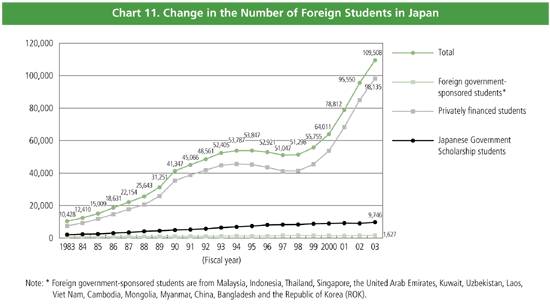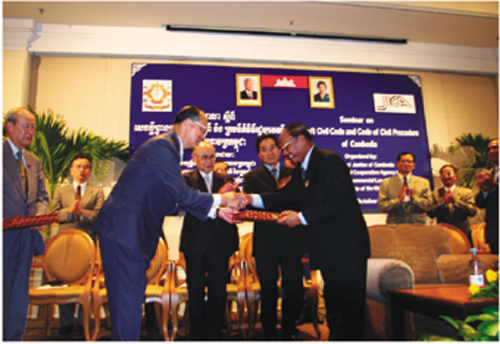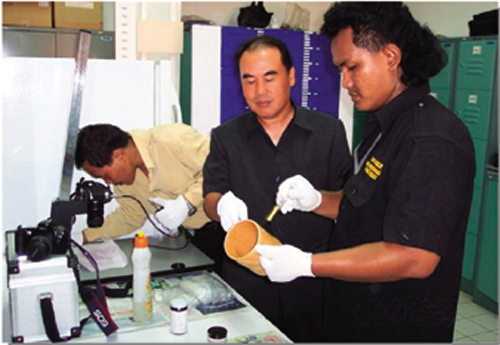

| Part III. | ODA DISBURSEMENTS IN FISCAL YEAR 2002 |
The development of individuals is the basis for the development
of a country, assistance for human resources development is one of the important
pillars of Japan’s assistance. Assistance for human resources development
not only fosters human resources that directly contribute to nation-building,
but also promotes mutual understanding through “person” to “person”
exchanges and plays a major role in promoting bilateral relations through building
human relationships between leaders from all sectors of society, including young
people who are responsible for the future of developing countries.
Japan’s assistance for human resources development is centered on acceptance
of foreign students, assistance to improve the capacity of government administrators,
assistance for the development and improvement of occupational capacities, assistance
for the improvement of industrial competitiveness, etc. And Japan is actively
utilizing information technology (IT) so that lower cost and higher quality
assistance for human resources development can be implemented.
In accordance with the “Plan to Accept 100,000 Foreign Students,”
*1 Japan has made efforts to enhance various measures for foreign
students, including a systematic development of the Japanese Government Scholarship,
financial aid to privately financed foreign students, etc., promotion of mutual
exchange system between students, enhancement of educational research institution
to foreign students. (In May 2003, the total number of foreign students accepted
reached approximately 109,500, therefore, the plan’s target was achieved.)
In the future Japan will promote measures for foreign students that aim to expand
foreign student exchange and increase its quality. The Ministry of Education,
Culture, Sports, Science and Technology allocated ¥54.12 billion to the
foreign student-related budget for fiscal year 2003 of which the ODA budget
accounts for ¥51.782 billion.
 |
|
*1:
Plan to Accept 100,000 Foreign Students |
In addition, the utilization of financial cooperation for human resources development
including acceptance of foreign students has been conducted. Specifically, the
“Grant Aid for Scholarship Program”9 from grant aid and
Japan has been providing “Exchange Student Loans,”10 from
ODA loans for human resources development in developing countries and for projects
to send foreign students to Japan.
As a fundamental philosophy, Japan also has assistance for the self-help efforts
of developing countries and with regard to assistance in the vocational capacity
development sector in developing countries, Japan is also cooperating with the
establishment and management of related facilities, dispatch of experts, acceptance
of trainees, etc. In fiscal year 2002, Japan implemented technical cooperation
projects for vocational capacity development policy and vocational training
in Viet Nam, Uganda, Tunisia, Ecuador, etc. through JICA, and provided support
through the acceptance of trainees, dispatch of experts, etc.
As assistance for the improvement of industrial competitiveness through human
resources development, Japan is implementing cooperation concerning the industrial
promotion of small and medium-sized enterprises and the development of mineral
resources and in recent years, cooperation has extended to development of industrial
foundation institutions and management technology for the improvement of productivity,
etc. and cooperation related to environmental and energy issues resulting from
industrialization. In fiscal year 2002 for example, Japan provided assistance
for the promotion of the automobile industry in four ASEAN countries—Thailand,
Indonesia, Malaysia, and the Philippines—and carried out technology transfer
of small and medium enterprise diagnostic methods in order to strengthen the
management of small and medium enterprises, which bear the central role in the
economy of Thailand. In Indonesia, Japan is implementing technical cooperation
for the expansion of the Institute for International Studies and Training into
the regions and other export promotion to improve casting technology and to
foster supporting industries through such measures as visits to the factories
of supporting industries to provide advice, etc.
In addition to this, Japan carried out the “Centers of Excellence (COE)
Comprehensive Program”11 (over two years from 2000 to 2002).
As a follow up to this program, Japan is planning to provide support for training
that is implemented by AOTS for COEs registered by the ASEAN countries beginning
in fiscal year 2003 and to hold workshops to share the good practices of each
country.
As one policy to support the reform efforts of Asian countries to move to market
economies, Japan has established the “Human Resources Development Centers
(Japan Centers)”12 with the major objective of the development
of human resources participating in actual economic activities. As of March
2003, Japan Centers have been opened in Laos, Kazakhstan, Uzbekistan, the Kyrgyz
Republic, Viet Nam, and Mongolia.
Japan is also carrying out human resources development in the IT sector and
is providing cooperation utilizing IT based on “Japan’s Comprehensive
Cooperation Package to Address the International Digital Divide” announced
in July 2000. Please refer to part III for details about the status of implementation of these measures.
Furthermore, as support for human resources development and nation-building
through higher education and promotion of culture in developing countries, Japan
is providing cooperation through cultural grant aid. For example, Japan is providing
cooperation for the purchase of language laboratory (LL) equipment for the Faculty
of Foreign Languages at the Royal University of Phnom Penh. By providing LL
equipment to the largest language education institution in Cambodia, Japan is
dramatically improving the language education environment—in particular
Japanese language education—in Cambodia and is playing a large role in
the human resources development through the promotion of higher education in
that country.
In developing countries “soft” assistance needs are
increasing. These needs include support for the formation of various institutions
and policies and support for the development of institutions in order to adapt
the structures of developing countries to an economic and social environment
that is changing daily as a result of economic globalization and in order to
promote socio-economic development.
In order to meet these sophisticated “soft” assistance needs, Japan
is implementing a variety of forms of support including dispatch of policy advisors
and assistance for development of legal systems. In relation to these forms
of assistance, Japanese experts in a variety of fields including trade, investment,
economics, law, etc. have been building mutually trusting relationships by holding
repeated dialogues with the people responsible for formulating policies, such
as economic reforms, etc. in the governments of developing countries, advancing
policy support projects in which they make recommendations concerning the long-term
development strategies of developing countries while fully taking into account
the actual situation in those countries, holding workshops and seminars in combination
with the policy support projects, improving the administrative capacity of the
related people in recipient countries, and carrying out human resources development.
This kind of “soft” assistance has in recent years been attracting
attention as a kind of intellectual support unique to Japan. Japan is actively
making efforts in this area while building domestic institutions.
Among the ASEAN countries, the current issues are complete recovery from the
Asian financial crisis of July 1997 and the strengthening of international competitiveness
in the ASEAN Free Trade Area (AFTA), established to liberalize the regional
economy. Japan is developing policy support projects tailored to the development
situation in each country. For example, by fiscal year 2002 Japanese experts
and the policy authorities in Laos had cooperated to formulate proposals in
a wide range of sectors including fiscal policy, finance policy, industrial
development, agricultural and rural development, poverty reduction, etc. and
Japan had implemented human resources development with the aims including increasing
the policy formulation capacity of the Laotian side, etc. In Myanmar Japanese
experts have made proposals in four sectors—fiscal and financial policy,
industry and trade, IT, and agricultural and rural development—as support
for economic structural adjustment policies. In addition, Japan is carrying
out economic policy support in Indonesia. (Refer for details.) These policy support projects have been carried out in the past
in Thailand, Viet Nam, Chile, etc. and they contribute to the development of
the recipient country and play an important role in building relations in a
new dimension between Japan and the recipient country.
In addition to these policy support projects, Japan is carrying out cooperation
such as acceptance of trainees, dispatch of experts, provision of equipment,
holding of workshops, etc. with the objective of developing the human resources
engaged in the planning and formulation of important policies, such as fiscal,
financial and industrial policies and policymaking in the developing countries.
In fiscal year 2002, Japan implemented a technical cooperation project through
JICA concerning support for development of legal systems in Viet Nam and Cambodia
and advanced intellectual support for developing countries in a variety of forms.
For example it dispatched policy support experts.
Trade related technical assistance is important for supporting the participation
of developing countries in the multilateral trading system centered on the World
Trade Organization (WTO) as global interdependence increases in the trade and
investment sector. At the Tenth Session of the United Nations Conference on
Trade and Development (UNCTAD X), Japan announced that it would carry out trade-related
human resources development of 2,500 people over five years beginning in fiscal
year 2000. But at the World Summit on Sustainable Development (WSSD) in Johannesburg
in August 2002, Japan increased this number and announced that it would train
4,500 people over the same period (five years from fiscal year 2000). In relation
to this, Japan co-chaired with the WTO a workshop for the African countries
and held a seminar in Egypt utilizing third country training.
In addition, with the objectives of establishing WTO rules and promoting free
trade, Japan is carrying out human resources development to promote understanding
of WTO agreements among developing countries that belong to the Asia-Pacific
Economic Cooperation (APEC) forum. And based on the “Strategic APEC Plan”
formulated under the leadership of Japan, JICA conducted a development study
entitled “WTO Capacity Building Program on the Implementation of WTO Agreements
in APEC Countries.” The program has the objective of supporting development
of WTO agreement implementation capacity in Thailand, Indonesia, Malaysia, the
Philippines, etc. and it held seminars for each sector. And JICA is holding
seminars in the countries of Asia and Africa to promote understanding of the
investment rules which Japan considers to be especially important.
Strengthening the foundations of democracy in developing countries
leads to public participation in governance and development and to the protection
and promotion of human rights, and so it is an extremely important factor in
promoting a country’s medium and long-term term stability and development.
In particular, based on the principles in the ODA Charter, it is important for
Japan to actively support developing countries making active efforts to achieve
democratization and provide lateral support for movements toward democratization.
In addition to democratization, the promotion of market economies and strengthening
of governance are important elements for the effective utilization of Japan’s
assistance. So Japan is also providing active assistance in these sectors.
Japan announced the Partnership for Democratic Development (PDD) at the G7 Lyon
Summit in 1996, which set forth the three principles of partnership, ownership
(self-help efforts of the developing country), and consultation and agreement
with the developing country and stated that Japan’s policy was to strengthen
efforts including development of legal and judicial systems, development of
election systems and other institution building, training programs for judicial
personnel, administrators, and police officers, assistance for elections, strengthening
of civil society, and support for the empowerment of women, etc.
Because assistance needs vary depending on the status of progress in democratization
and the movement toward market economy in developing countries, Japan is building
domestic assistance institutions based on collaboration with related government
ministries and agencies and related domestic organizations and is providing
multifaceted support through a variety of assistance types including acceptance
of trainees, dispatching of experts, development studies, facilities development,
provision of equipment, and support for NGOs, in order to appropriately respond
to the assistance needs of developing countries. Acceptance of trainees and
dispatch of experts was the main component of technical cooperation disbursements
in fiscal year 2002, but it can be said that a characteristic feature was the
relative increase in facilities development and equipment provision cooperation
compared to before against a background of increasing assistance needs in the
assistance for police sector, assistance for elections sector, assistance for
the media sector and other such sectors.
 |
| Ceremony to hand over the draft Civil Law and Civil Procedure Code to the Government of Cambodia (Photo: Ministry of Justice) |
For Cambodia, Viet Nam, Laos, and New Independent States
(NIS) such as Uzbekistan, etc. the development of legal systems is a current
issue as they make efforts to introduce market economies and adopt policies
to open their economies to foreign competition. In fiscal year 2002, Japan provided
support to these countries for the drafting and enacting of civil and commercial
laws, etc. and for the development of legal systems to train legal professionals.
In the drafting of legislation, the dispatched experts, etc. made determined
efforts aimed at creating laws that took into account the customs of the recipient
country and they are beginning to produce concrete results. In Cambodia, as
a result of cooperation to date, the Civil Law and Civil Procedure Code in the
Khmer language was completed and handed over to the Government of Cambodia in
March 2003. Japan’s efforts to support the development of legal systems
are only about ten years old, so Japan has relatively little experience in this
area. So it is hoped that Japan’s support for Cambodia, etc. will help
provide the direction for Japan’s future efforts in the development of
legal systems sector.
The African countries are making efforts at economic and social development
based on democratization policies. Japan is holding annual democratization seminars
for these countries with the objectives of introducing Japan’s democratization
concepts and experiences and enabling the African countries to use them for
their own democratization processes. In fiscal year 2002, Japan held seminars
for national assembly members from the ruling parties in Guinea, Togo, and the
Congo. These seminars were partly designed to lead up to the Third Tokyo International
Conference on African Development (TICAD III) in October 2003.
Even though Indonesia, Mongolia and the Latin American countries are moving
to democratic institutions, there is unease about fundamental governance. The
people do not trust the government due to the lack of administrative capacity,
domestic security issues and corruption. For these countries, Japan is placing
priority on human resources development including support for systems building
and improvements to administrative capacity, etc. and in combination with this,
is providing organic support including development of facilities and provision
of equipment. In Indonesia the national police were separated from and made
independent of the national army in 1999 and democratization of the organization
is being promoted with the aim of consolidating it as a civil police force.
In this context, Japan dispatched experts as “Adviser to chief of National
Police” in 2001 and followed this up by commencing a technical cooperation
project, the “Project on Enhancement of Civillian Police Activities,”
in August 2002. This project set up the Bekasi Police Station in the suburbs
of Jakarta as a model police station, strengthened the civil police functions
of the station through technology transfers in the organizational operations,
communications and control and on-the-ground identification sectors, and extended
the results of the project to police stations throughout Indonesia. In this
way, the project provided lateral support for police reform. To date, Japan
has dispatched experts in each sector and has carried out technical training,
etc. of employees of Bekasi Police Station.
In Afghanistan the conflict has just come to an end. In order to establish democratic
governance functions, Japan has strengthened administrative aspects that utilize
technical cooperation and financial cooperation, provided assistance for elections,
supported satellite broadcasting to provide television broadcasts about election
process to ordinary households throughout Afghanistan, and is taking other measures.
In order to encourage the consolidation of democracy in developing countries
and to promote public participation in politics and development, support for
the strengthening of civil society and the empowerment of women, which provides
the foundation of democratization, is indispensable. Japan has carried out a
variety of cooperation including technical cooperation, grant aid, and assistance
through the activities of NGOs. Concerning the status of implementation of assistance
for the empowerment of women please refer to Women in Development (WID) (Refer
for details).
 |
| Technical assistance for the Indonesian police: Japanese experts transferring identification technology (Photo: JICA) |
9. Established in fiscal
year 1999, this program provides financial cooperation, such as travel expenses
and tuition fees, etc., to organized and well-planned projects by the governments
of developing countries to dispatch foreign students to Japan. In fiscal year
2002 financial cooperation was provided to ten countries under the program,
including Viet Nam, Laos, Myanmar, etc.
10. This program uses Japan’s ODA loans
to support human resources development and foreign student programs in Japan.
To date approximately ¥59.2 billion has been provided to three countries:
Indonesia, Thailand, and Malaysia, and these funds have enabled a total of approximately
3,800 foreign students to come to Japan.
11. The objectives of this project are to
strengthen the functions of organizations selected as central human resources
development organizations in the ASEAN countries and known as COEs, and to promote
collaboration among human resources development institutions.
12. The three main functions of the Japan
Centers are (1) development of human resources participating in actual economic
activities in order to shift to market economy structures; (2) Japanese language
studies; (3) promotion of mutual understanding through the introduction of Japanese
culture, etc.